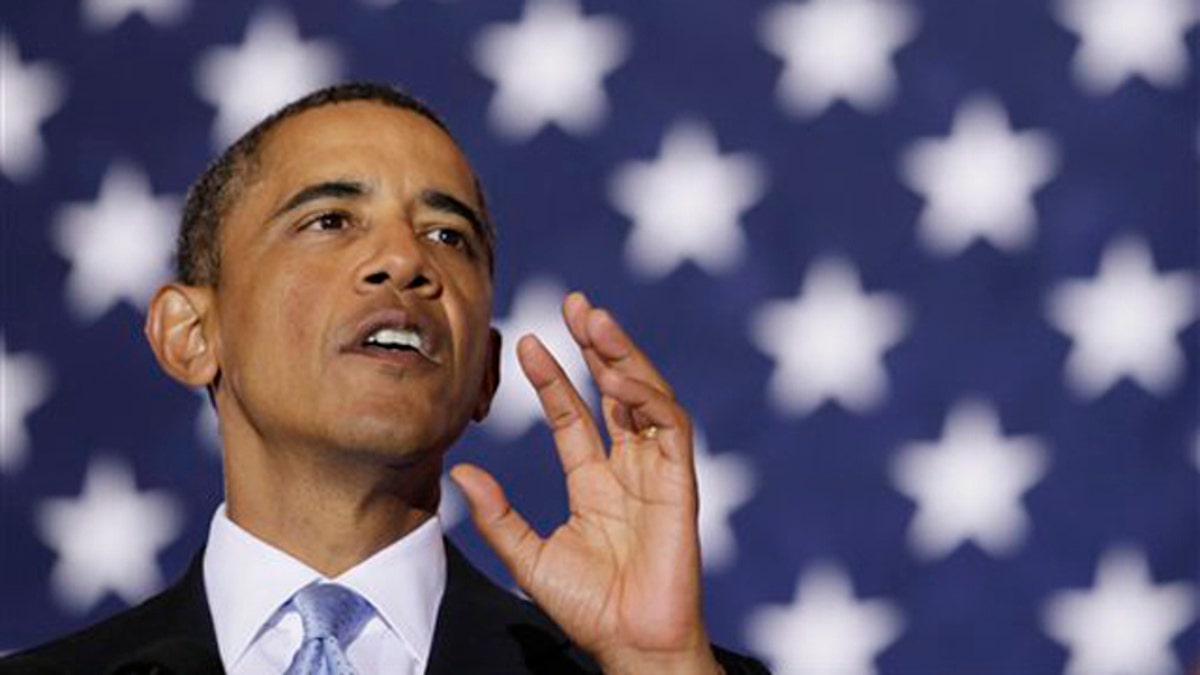
President Obama speaks at Xavier University of Louisiana in New Orleans Aug. 29 on the fifth anniversary of Hurricane Katrina. (AP Photo) (Copyright 2010 The Associated Press. All rights reserved. This material may not be published, broadcast, rewritten or redistribu)
Faced with data showing the economy is growing sparingly, President Obama on Monday called for a "full-scale attack" to revive the struggling economy and urged lawmakers fixated on the November election to pass another aid package for small businesses.
The president, after meeting with his economic team, said the administration is "hard at work" trying to find new ways to promote economic growth. Though the election is on the horizon, he urged Congress to quickly pass a small business lending bill and blamed Republicans for stonewalling the package.
"We have to do more," Obama said. "Holding this bill hostage is directly detrimental to our economic growth. I ask Senate Republicans to drop the blockade."
Senate Republican Leader Mitch McConnell countered that the bill would result in tax increases and that the administration's policies simply aren't working.
"It's time to listen to the American people, lower the deficit by reducing out-of-control spending, prevent tax hikes and work with Republicans to create the environment necessary to grow sustainable, private sector jobs," McConnell said in a written statement.
Obama spoke in the Rose Garden after new government figures showed a flash of good news. The Commerce Department reported Monday that consumer spending rose 0.4 percent, the fastest pace in four months.
But the so-called recovery remains in danger of limping along or even reversing in the second half of the year, economists warn.
Other economic vital signs suggest the latest pickup is a hiccup unless employers start adding jobs. Personal incomes went up just 0.2 percent in July -- that's an improvement over June, but they'll have to keep rising to sustain long-term growth in spending and the overall economy. A sequence of economic reports set for release later in the week should give a better picture of whether job growth is stuck in neutral.
Following a revised Commerce Department estimate last week showing the economy grew at just 1.6 percent in the second quarter, Moody's Analytics economist Gus Faucher said job growth could idle well into 2011 before employers start spending their cash reserves on new hires.
"It's going to be much softer than we prefer," he said, predicting the jobless rate will just about hold steady at 9.5 percent for August when the new employment numbers are released Friday.
Cato Institute fellow Dan Mitchell said this is not what a post-recession economic recovery is supposed to look like.
"Normally you're supposed to have a strong bounce," he said. "At best, we're simply slowly crawling our way back up to an average growth rate. We're not having a big bounce back to recover the lost output."
Mitchell said he doesn't expect a double-dip recession, but that hiring needs to improve.
"If you don't hire new people, it's really hard to get GDP up and national income up," he said.
The anemic pace of the recovery spells trouble for the incumbent party in Washington. An Associated Press/GfK poll conducted in mid-August showed 41 percent approving of Obama's handling of the economy, his lowest marks yet.
Rep. Paul Ryan, R-Wis., ranking Republican on the House Budget Committee, said Monday that the Democrats' stimulus policies are "failing miserably" -- and that businesses are holding back out of concern for looming tax increases.
"There's real talk of a double dip," Ryan said. "We are buying ourselves our own lost decade. ... That will give us a lost generation."
With few signs that a sudden economic surge will inspire new faith in Democrats' domestic policies before November, lawmakers are trying to keep the focus on jobs.
Obama, in an interview with NBC's "Nightly News," said Sunday that his administration "anticipated" a slowing recovery and called for new measures.
"The economy is still growing, but it's not growing as fast as it needs to," Obama said. "I've got things right now before Congress that we should move immediately. ... We should be passing legislation that helps small businesses get credit. That eliminates capital gains taxes so they have more incentive to invest right now. There are a whole host of measures we could take, no single element of which is a magic bullet, but cumulatively, can start continuing to build momentum for the recovery."
The second-quarter estimate for GDP growth was downgraded last week from its original 2.4 percent. Some economists forecast an equally idle 1.7 percent growth in the third quarter.
While the economy has grown for four straight quarters, the overall pace has averaged just 2.9 percent. Business investment in the first half of this year on new equipment and inventory helped boost recent growth, but that buildup may be leveling off.
Housing data also has been consistently dismal. Numbers for new home sales fell 12.4 percent in July, the slowest pace on record.
The trend lines have generally tilted in a steep downward direction since the expiration of the homebuyer tax credit at the end of April.
A memo on last week's GDP numbers from BBVA Research said estimates "confirm that substantial economic slack remains and the pace of growth is going to ease in the second half of the year."
The latest consumer spending statistics were nevertheless seen as a positive sign and taken by some as evidence that the economy is headed in the right direction. The July increase in consumer spending was the highest since a 0.5 rise in March.
Peter Newland, an economist with Barclays Capital Research, said in a research note that consumer spending will "continue to recover, albeit modestly, supported by a gradual improvement in labor income."
The Associated Press contributed to this report.




